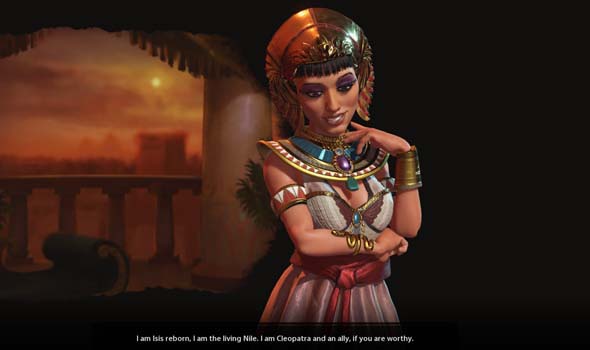
The announcement trailer for Sid Meier's Civilization VI made me very excited. Not just because there was a new iteration of my favorite PC game franchise, but also because the message of the trailer made me excited for the possibility that Civilization VI would take a much more humanist and globalist approach to its gameplay and victory conditions.
The Civilization games have always had a very optimistic tone, treating human development as being constantly progressing forward. Growing your civilization and building more things is almost always better. For the most part, Civilization treats human history as a constant forward march towards a better, more prosperous tomorrow.
This is despite the games including mechanics for "Dark Ages", climate change, nuclear fallout, occasionally pandemics and plagues, and so forth. Regardless of these mechanics, the civilizations of the game never regress, unless it's by the sword or gun of a conquering civilization, in which case, that other civilization is glorified. Climate change or nuclear winter can run rampant and render the surface of the Earth borderline uninhabitable for modern human life, but a civilization can still accumulate enough science or tourism or faith or diplomatic votes to win one of the various victories, or they can be the sole surviving civilization, presiding over a barren wasteland. But it's still a win.
Civilization is a game about cutthroat nationalism.
Despite vague gestures towards diplomatic cooperation and solving global crises, Civilization is, at its core, a game of competitive, cutthroat, zero-sum nationalism. This design ethos is probably the result of Civilization's inspirations coming from competitive board games like Avalon Hill's Civilization and Risk. "Our country is better than your country," and the whole game is an exercise in proving that. Further, one civilization's success must come at the expense of every other civilization's failure, even if those civilizations are friends or allies. One civ wins; all others lose. Every decision made is done to move your civilization closer towards one of those victory conditions, and every diplomatic agreement, trade deal, or alliance that you strike is only a temporary means to that end.
So what did Civ VI's trailer do to change my expectations for that game?
This essay is also available in video format on YouTube.
The trailer
Well, first, it's important to know how previous trailers and intro cinematics for Civilization games had introduced their respective games. Usually, they emphasized a single nation or leader doing great things. Winning wars, building wonders, developing advanced technologies, and so forth. And they usually ask the viewer: "How will you run your civilization?" and "Will your civilization stand the test of time?"
The trailer for Civilization VI takes a different approach. Let's take a look:
Civilization VI's announcement trailer celebrates the collective achievements of all of humanity.
"We are the explorers, the inventors, the architects of change, the builders of a better tomorrow.
We strive, we dream, we inspire, always towards something greater.
All the odds we defy, the risks we take, the challenges we endure, only make us stronger.
There's no end to our imagination, and no limit to civilization."
- Sean Bean narrating Civilization VI announcement trailer
Notice the language that is used. The Civ VI trailer uses plural language such as "we", "us", and "out". "We are the builders of a better tomorrow.". "the challenges we endure, only make us stronger." "There is no end to out imagination, and no limit to civilization.". And so forth. The trailer for Civilization VI isn't a celebration of one civilization or leader rising above all others and being crowned the "greates" civilization; it's about the collective achievement of all of humanity -- not a civilization, but all human civilization!
It's a beautifully humanistic expression that emphasizes plurality and doesn't elevate any one culture or race or nation above any other. It celebrates the collective technological advancements, engineering, art, and struggles of all of humanity, without implying that any one nation or group has the best stuff. It emphasizes that we can overcome challenges by working together, and come out the other side stronger for it. It implies that when we cooperate to build something or solve a problem, the result will be better than what any individual entity can accomplish. [More]

Civilization VI's first expansion, Rise and Fall just launched this past weekend. The expansion does make some welcome enhancements to alliances that makes peaceful relations with other civs much more appealing. However, these enhancements do not address two of my most fundamental complaints with Civilization's diplomacy system in general: that it does not allow for truly cooperative victories, and that it does not really provide the player with any way to influence an A.I. civ's behavior. I've already written about ideas for cooperative victories for both Beyond Earth and for the core Civilization games, so I won't go into that again here. Instead, today's blog will focus on the second of my major hang-ups with diplomacy: that you simply cannot provide A.I. civs with any indication of what you consider friendly or hostile behavior.
Diplomacy has always been one of the major stumbling blocks of the Civilization games. Each game has certain mechanics or features that are good ideas on paper, but none of the games have ever really had a diplomacy system that really seems to work the way that it is intended, and which provides consistent behavior from the A.I.s. A.I.s are often erratic in their behavior -- both between games, and within a single game.

A single unit can be the difference between Cleopatra's abject disgust and her goo-goo-eyed adoration.
Civ VI introduces the agendas, which sound like a good idea on paper. It gives each leader an element of personality. They have things that they like, and things that they don't like. The problem is that these agendas lead to wild swings in an A.I.'s attitude, often based on rather trivial (and sometimes counter-intuitive) actions from the player. Often times the thresholds for activating these agendas are not entirely clear. Cleopatra tells me that my army is too weak and pathetic, and so she has a heavy negative modifier with me. Then I build a single Swordsman a couple turns later, and now suddenly my army is powerful enough to warrant her admiration, and she's looking me up and down with those goo goo eyes.
There's other legacy issues with diplomacy. The biggest one is the inability to ever warn another civ that their actions might lead to war. The denouncement mechanic of Civ V was a decent start, but since you could never provide a specific reason for your denouncements, they never seemed to have much weight in changing another civ's behavior. In a multiplayer game, you could always use the chat to inform other players' of your diplomatic desires, but there has never been any method for accomplishing this with A.I. civs in single-player.
Since the A.I. has no real clue why it is being denounced, there's no way for it to change its behavior. There's also no way for other A.I.s to understand if your denouncement or declaration of war is actually justified or not.

You can denounce a civ, but the A.I. won't really have any clue why they're being denounced.
Civilization VI tried to rectify this with the Casus Belli system, but that system also stumbles... [More]
892bf8a7-123e-470d-b094-32cec0a5eb7a|2|5.0
Tags:Sid Meier's Civilization, Civilization, Civilization V, Civilization VI, Civilization VI: Rise and Fall, leader, diplomacy, casus belli, friendship, agenda, denouncement, act of war, war, quest, city state, alliance, victory, AI

Recently, I brainstormed the possibility of redesigning Beyond Earth's winstates in order to support cooperative victories. With Civilization VI having been announced last month, I want to take some time to look at some different ways to approach victories in the mainstream Civilization games. Since Civilization III, there have been five victory types that have appeared in every mainstream Civ game:
- the military victory = kill or conquer everyone else
- the science victory = build a space ship to Alpha Centauri
- the culture victory = accumulate the most culture yield (usually through wonders)
- the diplomatic victory = vote for yourself to be leader of the United Nations
- the score victory = if no other victories are met by a certain number of turns, the civ with the highest score wins.
Earlier games had fewer victories (only military and space race), but there have been other victory types as well. Civ III and IV had a victory that simply required the player to occupy a majority of the map's land area and population (which could be achieved via military conquest and/or relatively peaceful expansion). I liked this victory type because it facilitated role-play by allowing me to grow my empire organically without having to feel like I was constantly meta-gaming for one of the other victories - just keep growing by whatever means are necessary or convenient. Civ IV also had a religious victory that required you to convert other players to your religion and then get them to elect you to be Pope or whatever. Civ: Revolution and the board game even included an economic victory in which you must accumulate a certain amount of wealth tokens. This was different than the "economic victory" of Civ V, in which you save up enough money to buy out the alliance of every city state on the turn before a U.N. election.
Civilization IV included a religious victory [LEFT], and the board game includes an economic victory [RIGHT].
These victories are intended to provide a direct path to victory using each of the major fundamental gameplay styles. But are there other methods?... [More]
a7731900-5994-464b-bc32-bb3d6884e093|1|5.0
Tags:Sid Meier's Civilization, Civilization, Civilization V, Civilization VI, victory, military, science, culture, diplomacy, religion, high score, economy, peace, war, cooperation, humanism, humanist, alliance, ideology, space race, United Nations, world wonder, agenda, leaders, Theodore Roosevelt, board game, victory point, Ed Beach, Sean Bean, E3, Settlers of Catan, The Sims 2, Sid Meier's Civilization the Board Game

I started writing this post months ago (back in 2015, I think) - long before I had any inkling of the impending release of Civilization VI. This post may be entirely moot now that Civ VI has been announced, and it seems unlikely to me that Beyond Earth will see further expansions. However, I still want to present these ideas, so I've re-written this post to be less speculative and more retrospective. Even if these ideas aren't fated to be implemented for Beyond Earth, it's still an opportunity to look at a way in which the game could have differentiated itself from Civ V, and they could serve as a template for future Civ titles (maybe even Beyond Earth 2) or for modders. Maybe I'll even mod it in myself if I get time and motivation.
Civilization: Beyond Earth really struggled to separate itself from Civ V. The expansion, Rising Tide takes steps to address this with some of its new gameplay mechanics and revised diplomatic engine. Sadly, these efforts don't really address one of the underlying, fundamental, disconnects that the game has with me:
"One of the things that bothered me about Beyond Earth was the way that the victory conditions create an unnecessary competition between the different civs. Aren't we all just colonists from the same earth who are supposed to be trying not to repeat the mistakes of the past? Aren't we trying to preserve the human race? Without the various civs starting the game with any sort of pre-established ideology or agendas, there's no reason for them to be competing with one another. Without a genuine shared victory, there's also no systems in place to share your colonial success with your fellow colonies. The net effect is that once you've defeated the challenge of taming the planet and [one way or another] eliminating the aliens as a threat to your expansion, then the rest of the game is a competition between civs to be the first to reach any of the [mechanically satisfying and varied, yet intellectually vapid] victory conditions."
- from my Rising Tide review

Heck, why are we competing to begin with?
Despite being mechanically different from Civ V's victory conditions, Beyond Earth still fell into the trap of being fundamentally, unnecessarily tribalistic and competitive. I don't know if this is supposed to be some kind of sad, fatalist message that Firaxis is writing into Beyond Earth: that we are doomed to repeat the mistakes of the past. This isn't Fallout. I hope that Firaxis' designers aren't that cynical, and that it was an unintentional emergent consequence of design.
This may seem like a small, trivial, superficial issue, but it's not. Regular Civilization is easy to buy into because it's based [loosely] on established history and uses real-world characters and states that most people are already familiar with. Buying into the theme of Beyond Earth is just so much harder because there's so much of the game that just doesn't make sense, or which doesn't really follow from the opening cinematic or the game's flavor text. This is why Alpha Centauri went to such great pains to personlize the leaders, and to turn them into charicatures of established real-world ideologies and standard sci-fi tropes. These are factions with established goals and agendas that we can understand, and we can buy into their conflicts. Beyond Earth doesn't have that, and so not only do its leaders fall flat as characters unto their own, but the entire basis upon which the game's core conflicts and victory conditions are based start to fall apart as well.
In any case, I think that one of the best ways that Beyond Earth could have truly separated itself from Civ V (mechanically and thematically) would have been to change the competitive nature of the victories and introduce truly cooperative victories, or maybe even a "players versus map" victory type. And I want to emphasize from the start that I haven't put nearly as much time into Beyond Earth as I have into Civ V. I'm by no means an "expert" in the game. So feel free to take the following suggestions with a grain of salt. I admit that these ideas simply might not work, but I still think that it's worthwhile to explore the possibility space that this game could have offered... [More]
41c56220-e572-46c7-b911-40df5b0b6ab2|1|5.0
Tags:Sid Meier's Civilization, Civilization: Beyond Earth, Civilization: Beyond Earth: Rising Tide, Firaxis, 2K Games, PC, Steam, strategy, grand strategy, turn-based strategy, science fiction, space, victory, cooperation, alliance, harmony, purity, supremacy, contact, first contact, domination, board game, Battlestar Galactica, Pandemic, Arkham Horror, Mansions of Madness, Descent: Journeys in the Dark
|

| 12 | | | | | | | 60 | | 11 | | | | | | | 55 | | 10 | | | | | | | 50 | | 09 | | | | | | | 45 | | 08 | | | | | | | 40 | | 07 | | | | | | | 35 | | 06 | | | | | | | 30 | | 05 | | | | | | | 25 | | 04 | | | | | | | 20 | | 03 | | | | | | | 15 | | 02 | | | | | | | 10 | | 01 | | | | | | | 05 |
|